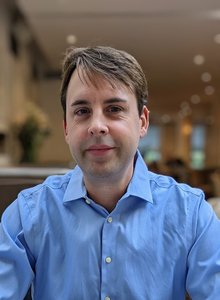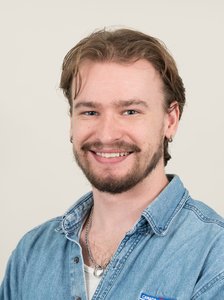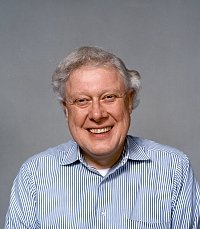Arrivals
Bob Christensen
Project Manager - TAME/CSA Project

Bob joined the Department as a project coordinator on May 06, 2024. He supports two key projects: the “Toronto Atmospheric Monitoring of Emissions (TAME)” and research funded by the Canadian Space Agency related to Earth Observation satellite missions. Previously, he served as a Research Group Administrator in the Department of Pharmacy, where he managed operational activities and financial planning for a biotechnology lab. With over 12 years of experience in research administration at UofT, Robert excels in project management, financial oversight, and organizational planning to facilitate communication among team members.
Patrick Wishart
ATLAS QA/QC Operator

Patrick joined the Physics Department on February 29, 2024. Patrick graduated in 2023 with his BSc in physics from Brock University and is currently pursuing his MEng in nuclear engineering at McMaster University. Patrick has extensive experience in lab environments and performing data analysis, gained through his undergraduate studies. He is passionate about physics and loves deepening his understanding of the subject. Patrick is particularly interested in astronomy and observes the sky in his free time.
Departures
Professor Robert Orr

Bob Orr is one of the longest serving members of the Department of Physics. Over his long tenure at the U of T he has been a mentor to many people, at all levels including undergraduate and graduate students, postdocs, engineers, technicians and junior faculty. Bob has been one of the agents of change in the department, helping set the direction of the experimental high-energy physics group over the last four decades.
Bob did his undergraduate and graduate work at University College London. Following that, he held research associate positions at Rutherford Appleton Lab in the UK and then at the University of Wisconsin at Madison. In the mid 1970s he was awarded a CERN fellowship and, following that, a CERN Staff position, which he held until being lured to Canada in 1981.
Bob’s career has overlapped almost completely with the period over which the Standard Model of particle physics was developed and experimentally verified. Highlights of his early work include some of the first experiments important to these developments, including investigations of the parton structure of the nucleon, observation of weak neutral currents, and early observations of charmed particles. He was a leading proponent of Canadian involvement in the ARGUS experiment at the Deutsches Electronen Synchrotron (DESY) lab in Hamburg, which made numerous discoveries about bottom quarks. He likewise played a leading role in involving Canada in the ZEUS experiment, at the HERA electron-positron collider, also at DESY, which made some of the most precise measurements about the behaviour of quarks inside the proton. He also worked on the CDF experiment at the Fermilab Tevatron, where the top quark was discovered.
Bob led the Canadian effort in the ill-fated Superconducting Super-Collider (SSC) which was cancelled by the US Congress in 1993. That left the ATLAS experiment as the only “game in town” for study of the highest achievable energies. He quite naturally turned his attention to this work, at the Large Hadron Collider (LHC) at CERN, serving as the spokesperson for the Canadian ATLAS group from 1994 to 2008, shepherding an ever-growing national group through the necessary cycles of funding requests, R&D, and construction and commissioning. Under his leadership Canada produced several key elements of the ATLAS detector, and developed the computing resources needed for the analysis of the complex data from the LHC. The Toronto group became the largest Canadian effort in ATLAS, in large part due to Bob’s determination.
The 2012 discovery of the Higgs Boson by ATLAS and CMS completed confirmation of the particle content of the Standard Model, ending a quest that started before Bob was an undergraduate student and leading to the awarding of the 2013 Nobel Prize in Physics to Peter Higgs and François Englert, for the prediction of its existence. ATLAS is currently operating, but also preparing significant detector upgrades to be installed starting in 2026. Though retired, Bob remains an important part of the large team working on a new innovative tracking detector for ATLAS, which is made entirely silicon, in order withstand the harsh environment that will be present at the high-luminosity LHC, which is scheduled to begin operation in the early 2030s.
Bob also has a longstanding interest and involvement in accelerator physics. He worked for many years on R&D for superconducting Radio Frequency cavities, during a sabbatical leave at KEK in Japan, in 2005-06, and then back home in Canada, funded by a series of NSERC awards, in collaboration with colleagues at TRIUMF and Fermilab. His enthusiasm for this topic is one he shared with dozens of graduate students in this department (as part of the PHY2405 graduate course in Experimental High-Energy Physics). Bob also taught generations of U of T undergraduates. Most recently he took on two separate large second-year lecture courses, PHY252 (Thermal Physics) and PHY250 (Electricity and Magnetism). Both courses were very well received by students and, in the case of PHY250, resulted in his being awarded one of the two PhySU teaching awards for the 2022-23 academic year. Bob has also provided many undergraduate students with their first research opportunities and still has a team of talented undergraduates helping with the silicon tracker work. Over the course of his career, he has supervised a large number of graduate students and postdocs, many of whom are now in faculty positions around the world.
Bob has been a fellow, visiting scholar or visiting professor at: CERN, KEK in Japan, Fermilab and the Weizmann Institute in Israel, and is the recipient of numerous recognitions, including being named a Fellow of American Physical Society, and a Fellow of the Royal Society of Canada.
Hopefully this gives a flavour of all that Bob has done for our students and our research into the most fundamental mysteries of our world. He has been a true intellectual leader of our group. We have been fortunate to have him as a colleague, and even more fortunate that he continues with us as an emeritus, active as ever.
By Prof. Peter Krieger


